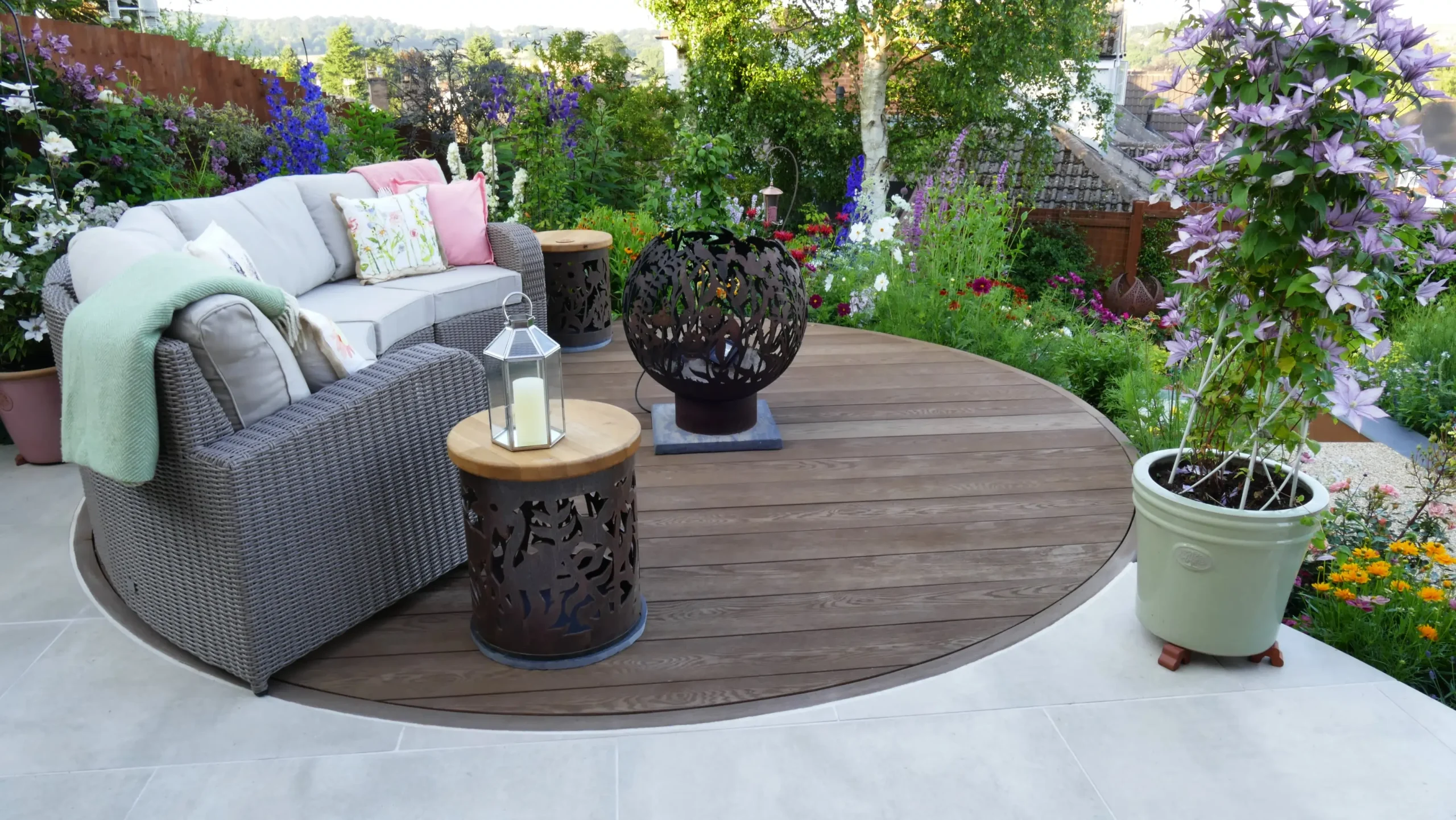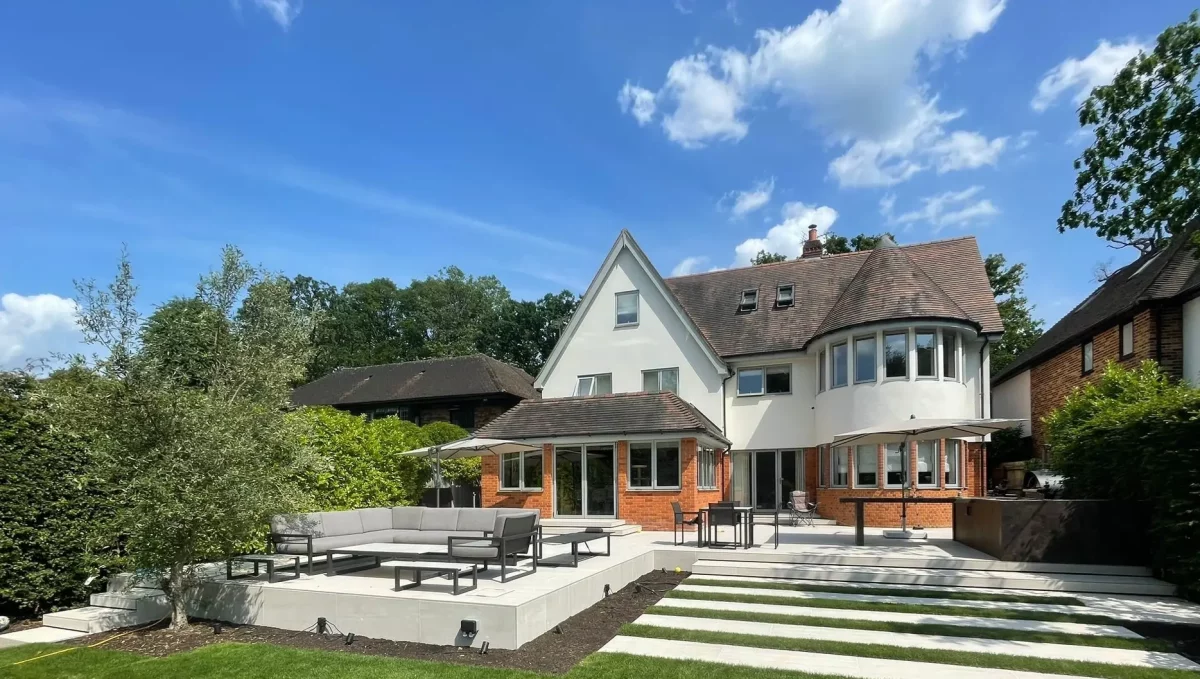Simple idea; big reward. Using our factory sealing service—so that your natural stone or porcelain paving arrives on-site pre-sealed—saves you time and effort. Even better, it protects your investment.
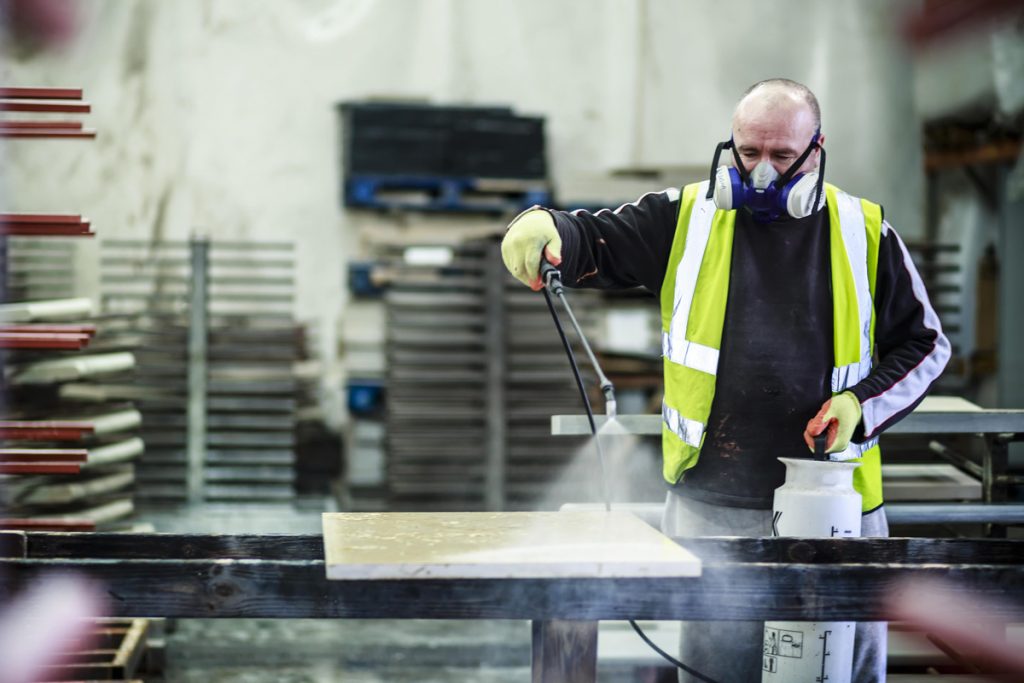
You've planned a brand-new patio or driveway and you're thinking of sealing it. You could do it yourself, if you get the time and the right weather conditions. Or you could have your paving pre-sealed. That is, having it sealed before it leaves the depot. This way, your paving arrives ready treated, ensuring that hold-ups due to inclement weather are minimised and your stone is protected from staining during installation (though excess grout and mortar spilt onto the surface while laying still need to be removed immediately).
The advantages of sealed paving from London Stone
If you're a contractor, you'll find pre-sealing saves time and trouble, enabling you to keep a client happy by completing a job faster. How many of you would struggle to find time to return to an otherwise completed build to seal it?
If you're a homeowner, thinking to seal the stone yourself once it's down, the requirements for successful stone sealing might make you decide pre-sealing is an investment worth making.
What you get with London Stone sealing
- Reliable products. We always use Dry Treat sealants which, after working with a number of other products over the years, we've found to be by far the best. Find out why we use Dry Treat paving sealers.
- Weather-proofing. Watch our video above and you'll see we do the work under cover. This is an enormous benefit, as we can seal all year round without worrying about that torrential rain heading our way. The stone remains bone-dry, which is exactly what it needs to be for sealing to be successful.
- Experience. Our guys at the factory seal stone all day long. They've been doing it for years and, more than anyone, they know when the stone is fully cured and how to get the best results. This can be tricky for the less experienced. We always recommend that you leave stone for six hours once sealant is applied but timings can vary according to conditions. The temptation to lay stone before that—when perhaps it looks ready but isn't—will result in fingerprint marks and a patchy finish.
- Guarantee. London Stone is an approved contractor for Dry Treat. This means that your sealed paving is guaranteed for 15 years (Dry Treat Premium Impregnating Sealer) or five years (Dry Treat Colour Enhancing Sealer).
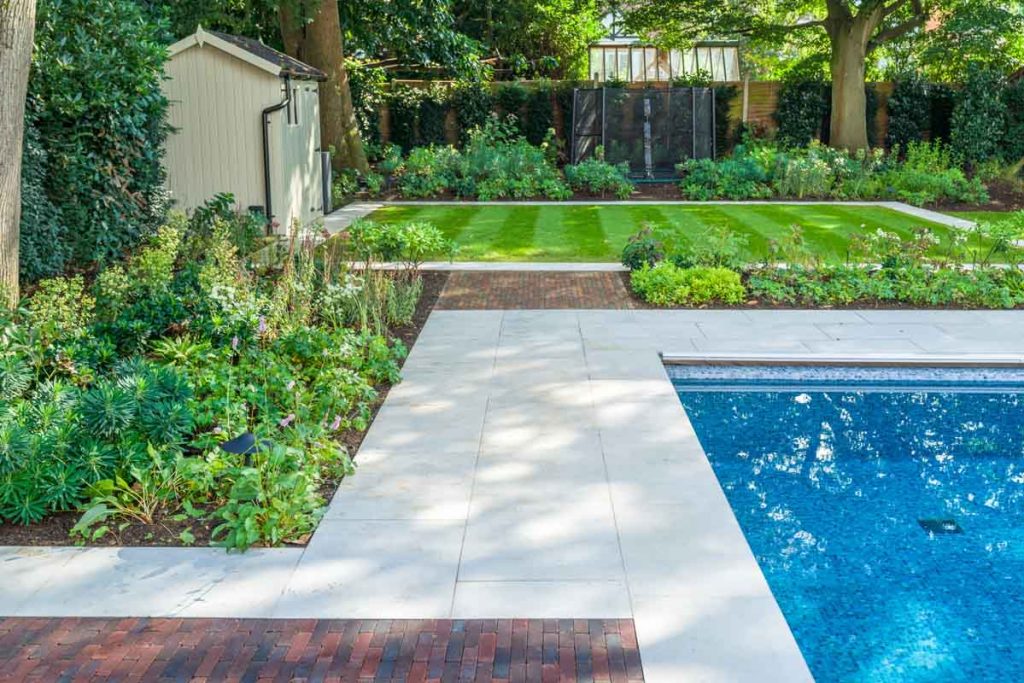
Why we recommend that stone is sealed
Whether you receive paving pre-sealed or seal it yourself on-site, we always recommend sealing for sawn sandstone and limestone. It is more vulnerable to staining than riven stone or very dense stone like granite. Sealing can be appropriate for any paving, though, in certain circumstances. Our guide to sealing tells you more.
Stains easier to remove
Sealing prevents stains from becoming permanently engrained. Coke, red wine, tomato sauce, sausage grease—all the dangerous ingredients of a barbecue will be far more easily removed if the stone has been sealed. The same applies to organic stains—grass cuttings, the brown marks that occur when leaves break down on the surface. Again, these won't penetrate permanently.
An oil leak from a car would prove more problematic, even with sealing, but if the stone had been treated, this would help massively in getting a good result when taking remedial action.
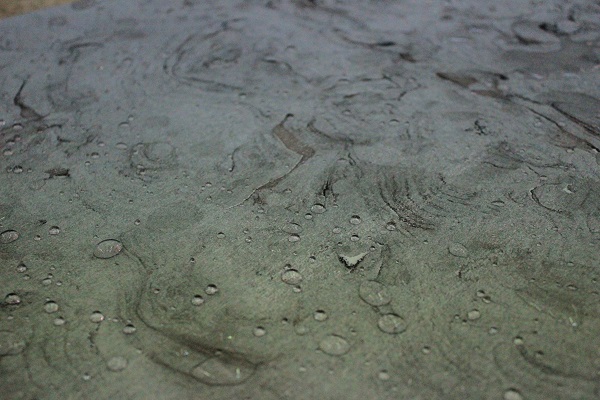
Efflorescence is prevented
Efflorescence can happen to any stone, as salts migrate to the surface. Sealing works in two directions, so not only preventing stains from soaking in, but salts from rising up.
Picture framing is prevented
This occurs where unsealed, dry stone sucks moisture in from the newly applied mortar. There's nothing you can do about it because, once the stone is dry, the pigment drawn in alongside the moisture sets solid and won't be shifted. Extreme examples occur when coloured mortar is used with light-coloured stone. Result? A ruined patio.
Sealing prevents this nightmare scenario because it doesn't just affect the surface of the stone; it soaks into the sides, too, and to the same depth, so pigment can't penetrate.
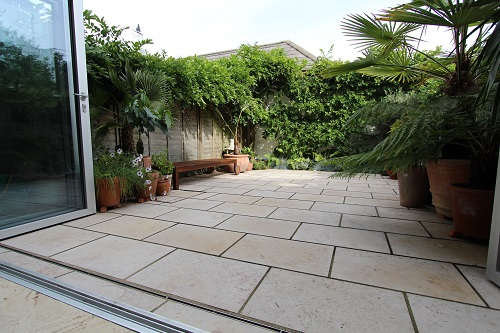
Reduces the need to clean
Sealed stone generally repels dirt, reducing the need to clean. Our own director Chris Durnford recently installed pre-sealed Sawn Grey Yorkstone. “When it rains,” he said, “the water runs off easily and takes some of the dirt away with it.”
So, there you have it. Installing new paving is a significant investment in your property. With high-quality products that mean the sealant will last for at least 15 years, our paving sealing service offers you peace of mind, knowing that your investment is protected and you can enjoy your outdoor space without the need for extra care.
For more information, give us a ring, click on Live Chat on this page, or visit one of showrooms.
Post updated: February 2024


/filters:quality(40)/mediadev/media/homepage/price_right_arrow.svg)
/filters:quality(60)/mediadev/media/menu-pics/menu_banner_mobile.png )
/filters:quality(60)/mediadev/media/menu-pics/all-porcelain.jpg )
/filters:quality(60)/mediadev/media/menu-pics/luxury-italian.jpg )
/filters:quality(60)/mediadev/media/menu-pics/premium-italian.jpg )
/filters:quality(60)/mediadev/media/menu-pics/budget-porcelain.jpg )
/filters:quality(60)/mediadev/media/menu-pics/large-format-porcelain.jpg )
/filters:quality(60)/mediadev/media/menu-pics/wood-effect-porcelain.jpg )
/filters:quality(60)/mediadev/media/menu-pics/porcelain-planks.jpg )
/filters:quality(60)/mediadev/media/menu-pics/porcelain-setts.jpg )
/filters:quality(60)/mediadev/media/menu-pics/browse-all-paving.jpg )
/filters:quality(60)/mediadev/media/menu-pics/stone-paving.jpg )
/filters:quality(60)/mediadev/media/menu-pics/interior-tiles.jpg )
/filters:quality(60)/mediadev/media/menu-pics/stone-effect-porcelain.png )
/filters:quality(60)/mediadev/media/menu-pics/wood-effect-porcelain.png )
/filters:quality(60)/mediadev/media/menu-pics/grey-porcelain.png )
/filters:quality(60)/mediadev/media/menu-pics/beige-porcelain.png )
/filters:quality(60)/mediadev/media/menu-pics/dark-porcelain.png )
/filters:quality(60)/mediadev/media/menu-pics/light-porcelain.png )
/filters:quality(60)/mediadev/media/menu-pics/patio-grout.jpg)
/filters:quality(60)/mediadev/media/menu-pics/primers.jpg)
/filters:quality(60)/mediadev/media/menu-pics/porcelain-blades.jpg)
/filters:quality(90)/mediadev/media/menu-pics/drainage.jpg)
/filters:quality(60)/mediadev/media/menu-pics/cleaners.jpg)
/filters:quality(60)/mediadev/media/menu-pics/all-stone-paving.jpg )
/filters:quality(60)/mediadev/media/menu-pics/all-sawn-paving.jpg )
/filters:quality(60)/mediadev/media/menu-pics/all-riven-paving.jpg )
/filters:quality(60)/mediadev/media/menu-pics/indian-sandstone.jpg )
/filters:quality(60)/mediadev/media/menu-pics/limestone-paving.jpg )
/filters:quality(60)/mediadev/media/menu-pics/granite-paving.jpg )
/filters:quality(60)/mediadev/media/menu-pics/slate-paving.jpg )
/filters:quality(60)/mediadev/media/menu-pics/yorkstone-paving.jpg )
/filters:quality(60)/mediadev/media/menu-pics/stone-pavers.jpg )
/filters:quality(60)/mediadev/media/menu-pics/cobbles-setts.jpg )
/filters:quality(60)/mediadev/media/menu-pics/plank-paving.jpg )
/filters:quality(60)/mediadev/media/menu-pics/paving-circles.jpg )
/filters:quality(60)/mediadev/media/menu-pics/bespoke-paving-1.jpg )
/filters:quality(60)/mediadev/media/menu-pics/edging-stones-1.jpg )
/filters:quality(60)/mediadev/media/menu-pics/prestige-stone.jpg )
/filters:quality(60)/mediadev/media/menu-pics/grey-blue-stone.png)
/filters:quality(60)/mediadev/media/menu-pics/swatch-black-dark.jpg )
/filters:quality(60)/mediadev/media/menu-pics/swatch-buff-beige-white.jpg )
/filters:quality(60)/mediadev/media/menu-pics/sealants.jpg)
/filters:quality(60)/mediadev/media/menu-pics/all-clay-paving.jpg )
/filters:quality(60)/mediadev/media/menu-pics/alpha-clay-pavers.jpg )
/filters:quality(60)/mediadev/media/menu-pics/cottage-garden-clay-pavers.jpg )
/filters:quality(60)/mediadev/media/menu-pics/kessel-garden-clay-pavers.jpg )
/filters:quality(60)/mediadev/media/menu-pics/artisan-clay-pavers.jpg )
/filters:quality(60)/mediadev/media/menu-pics/grey-blue-clay-paver.png )
/filters:quality(60)/mediadev/media/menu-pics/red-brown-clay-pavers.png )
/filters:quality(60)/mediadev/media/menu-pics/beige-buff-clay-pavers.png )
/filters:quality(60)/mediadev/media/menu-pics/composite-decking.jpg )
/filters:quality(60)/mediadev/media/menu-pics/designboard-decking.jpg )
/filters:quality(60)/mediadev/media/menu-pics/classic-designboard.jpg )
/filters:quality(60)/mediadev/media/menu-pics/brushed-designboard.jpg )
/filters:quality(60)/mediadev/media/menu-pics/grooved-designboard.jpg )
/filters:quality(60)/mediadev/media/menu-pics/millboard-decking.jpg )
/filters:quality(60)/mediadev/media/menu-pics/grey-decking.jpg )
/filters:quality(60)/mediadev/media/menu-pics/black-charcoal-decking.jpg)
/filters:quality(60)/mediadev/media/menu-pics/brown-decking.jpg)
/filters:quality(60)/mediadev/media/menu-pics/all-build-deck.png )
/filters:quality(60)/mediadev/media/menu-pics/stone-cladding.jpg )
/filters:quality(60)/mediadev/media/menu-pics/all-garden-walling-1.jpg )
/filters:quality(60)/mediadev/media/menu-pics/facing-bricks.jpg )
/filters:quality(60)/mediadev/media/menu-pics/garden-screening.jpg )
/filters:quality(60)/mediadev/media/menu-pics/menu_Garden_banner_desk.png )
/filters:quality(60)/mediadev/media/menu-pics/all-steps-coping.jpg )
/filters:quality(60)/mediadev/media/menu-pics/stone-garden-steps.jpg )
/filters:quality(60)/mediadev/media/menu-pics/sawn-steps.jpg )
/filters:quality(60)/mediadev/media/menu-pics/riven-steps.jpg )
/filters:quality(60)/mediadev/media/menu-pics/yorkstone-steps.jpg )
/filters:quality(60)/mediadev/media/menu-pics/bespoke-steps.jpg )
/filters:quality(60)/mediadev/media/menu-pics/porcelain-steps.jpg )
/filters:quality(60)/mediadev/media/menu-pics/off-the-shelf.jpg )
/filters:quality(60)/mediadev/media/menu-pics/stone-coping.jpg )
/filters:quality(60)/mediadev/media/menu-pics/sawn-coping.jpg )
/filters:quality(60)/mediadev/media/menu-pics/riven-coping.jpg )
/filters:quality(60)/mediadev/media/menu-pics/yorkstone-coping.jpg )
/filters:quality(60)/mediadev/media/menu-pics/bespoke-coping.jpg )
/filters:quality(60)/mediadev/media/menu-pics/stone-pier-caps.jpg )
/filters:quality(60)/mediadev/media/menu-pics/porcelain-coping.jpg )
/filters:quality(60)/mediadev/media/menu-pics/all-bespoke-services.jpg )
/filters:quality(60)/mediadev/media/menu-pics/bespoke-paving-2.jpg )
/filters:quality(60)/mediadev/media/menu-pics/bespoke-steps-1.jpg )
/filters:quality(60)/mediadev/media/menu-pics/bespoke-coping-1.jpg )
/filters:quality(60)/mediadev/media/menu-pics/edge-profiles.jpg )
/filters:quality(60)/mediadev/media/menu-pics/masonry-services.jpg )
/filters:quality(60)/mediadev/media/menu-pics/deluxe-pergolas.jpg )
/filters:quality(60)/mediadev/media/menu-pics/proteus-pergolas.jpg )
/filters:quality(60)/mediadev/media/menu-pics/corten_planter_menu.png )
 Trade Discount Available
Trade Discount Available FREE Nationwide Delivery
FREE Nationwide Delivery Nationwide Showrooms
Nationwide Showrooms Live Stock Levels
Live Stock Levels Split Packs Available
Split Packs Available
